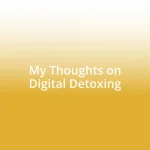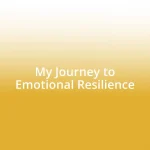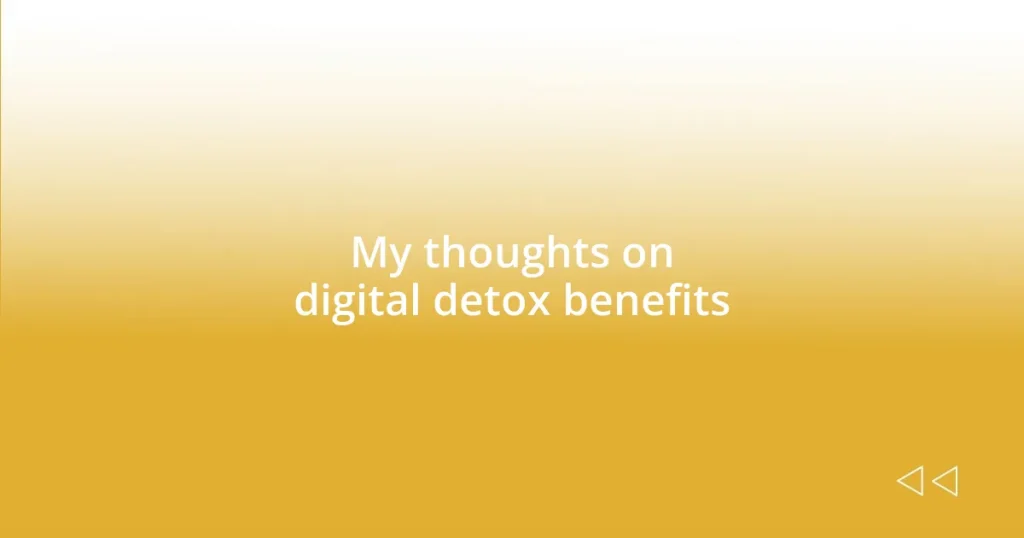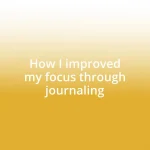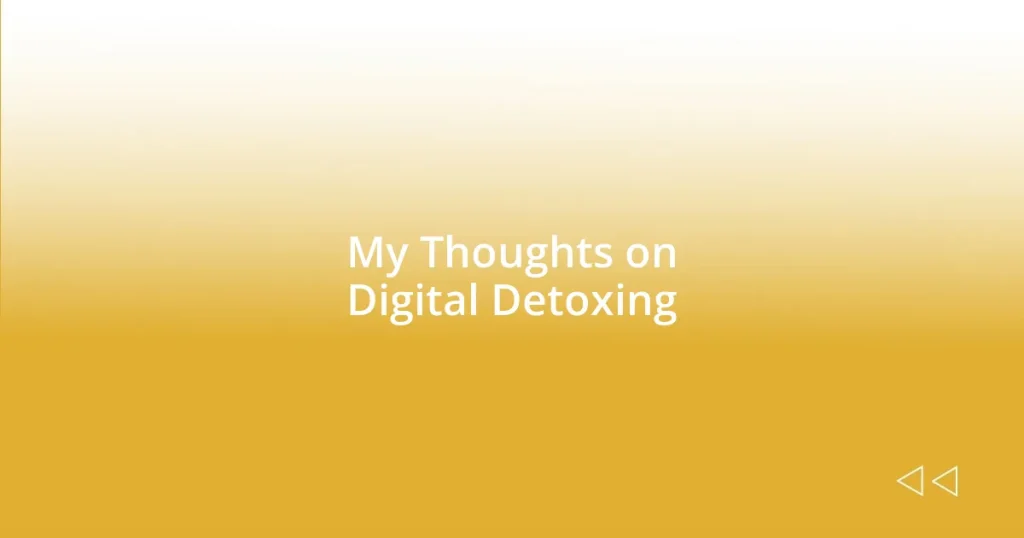Key takeaways:
- A digital detox can enhance focus, productivity, and personal relationships by reducing screen time and increasing real-world engagement.
- Signs of digital overload include constant phone checking, anxiety when disconnected, and prioritizing virtual connections over real-life interactions.
- Effective planning for a detox should include setting boundaries, preparing alternative activities, and starting with small, manageable periods away from screens.
- Success stories illustrate the profound positive changes in clarity, creativity, and emotional connections that can emerge from taking breaks from digital devices.

Understanding digital detox benefits
Taking a break from our screens can feel daunting, but I’ve found the benefits of a digital detox to be transformative. For instance, during my last tech-free weekend, I discovered how refreshing it was to connect with nature. Instead of scrolling through social media, I immersed myself in the moment, which sparked an overwhelming sense of peace and clarity.
It’s fascinating to think about how much time we spend online, often at the expense of real-world experiences. I remember feeling anxious when I first attempted a detox, worried that I would miss out on what my friends were sharing online. However, I soon realized that those precious moments spent away from my device enriched my relationships and enhanced my creativity. Have you ever felt that sense of freedom when you finally unplug?
Moreover, a digital detox enhances our focus and productivity. When I committed to limiting my screen time, I noticed my ability to concentrate improved significantly. I could dive deeper into my hobbies and projects without the constant pull of notifications calling my name. Isn’t it incredible to think how much we can accomplish when we simply step away from our devices?

Recognizing digital overload signs
Recognizing when digital overload kicks in can be quite the eye-opener. I can recall a period when I felt an incessant pull to my phone, even during family dinners. That’s when I realized I was losing precious moments with loved ones for fleeting online notifications. The signs of digital overwhelm often creep in unnoticed, so it’s essential to be aware of them.
Here are some signs to look out for that might indicate you’re experiencing digital overload:
– Constantly checking your phone, even if there are no notifications.
– Feeling anxious or irritable when you can’t access your device.
– Difficulty concentrating on tasks without background noise from your devices.
– A sense of urgency to reply to messages immediately rather than enjoying the moment.
– Skipping real-life interactions for virtual connections.

Planning an effective digital detox
Planning an effective digital detox requires some forethought and structure. I remember when I first embarked on this journey, I assumed simply turning off my devices would suffice. However, I quickly learned that creating a detailed plan was essential. Setting clear boundaries, like designating specific “screen-free” zones or times, helped me stay committed. Have you ever mapped out your digital habits?
Moreover, preparing yourself mentally can make all the difference. I recall feeling a mix of excitement and trepidation before my first detox. I made a list of alternative activities—like reading, gardening, or connecting with friends face-to-face—that I could turn to during my device-free time. By having engaging options at hand, I felt less temptation to check my phone. Isn’t it interesting how the right preparations can transform a seemingly tough challenge into an enjoyable adventure?
Finally, don’t be afraid to start small. I initially reduced my screen time gradually, and it worked wonders! Instead of a week-long detox, try a day or even just a few hours. Each little step built my confidence and allowed me to appreciate the moments I was reclaiming. As you consider your own digital detox, what smaller goals can you set to ensure success?
| Step | Details |
|---|---|
| Plan Ahead | Structure your detox by deciding when and for how long you will unplug! |
| Prepare Activities | List engaging activities you enjoy to fill your time without screens. |
| Start Small | Begin with short, manageable detox periods to make it less daunting. |

Key activities during digital detox
Engaging in physical activities can be a game changer during a digital detox. I fondly remember hiking on a beautiful Saturday, leaving my phone behind. The crisp air and serene sounds of nature reminded me of the joy found in the moment, rather than through a screen. Have you ever felt the peace that comes from simply disconnecting and being present in the outdoors? It’s an invigorating experience that not only boosts your mood but also enhances your connection with the world around you.
Another enriching activity is indulging in creative pursuits like painting or journaling. I discovered that expressing my thoughts on paper, free from digital interruptions, helped me to process my feelings. I’d get lost in the rhythm of my own words, and sometimes, I found revelations about myself that I hadn’t realized before. Isn’t it fascinating how creativity can flourish when you step away from digital distractions? Those moments fueled my passion and offered a refreshing perspective.
Importantly, reconnecting with those around you provides a profound emotional reward. I recall one evening spent cooking with friends, where laughter and conversation flowed freely, unhindered by notifications or screens. Sharing experiences and making memories face-to-face deepens relationships in ways that digital interactions simply can’t. Reflecting on such moments makes me wonder: what relationships could you nurture more deeply by prioritizing personal connection over digital ones?

Success stories from digital detox
Many individuals have experienced profound transformations through digital detoxes. I recall meeting someone who took a month-long break from social media, and the impact was remarkable. They described a newfound clarity in their thoughts and decisions, emphasizing how their creativity poured out in writing and art, unencumbered by the constant comparisons on their feeds. Have you ever considered how different your perspective could be if you paused the digital noise?
Then there’s the story of a close friend who decided to disconnect during family gatherings. She initially felt anxious, worried about missing out on online interactions. However, she soon realized these moments were richer and more meaningful when shared without distraction. I felt her joy when she recounted laughter-filled evenings and heartfelt conversations that deepened their bonds. Isn’t it interesting how simply being present can enrich relationships?
I must also mention a remarkable case of someone who tackled anxiety through a strategic digital detox. After just a week away from screens, they reported significantly reduced stress levels. They found comfort in quiet mornings instead of frantically scrolling through feeds. Personally, witnessing their transformation was heartening, and it made me reflect on how often we use screens as a crutch rather than facing our thoughts. Why do we hesitate to embrace solitude when it can lead to such profound self-discovery?

Tips for maintaining digital balance
To maintain a digital balance, setting specific time limits for screen use can be incredibly helpful. I personally find that allocating certain hours for checking emails or scrolling through social media keeps me focused and prevents those hours from blending into the chaos of my day. Have you ever noticed how easy it is for minutes to turn into hours when you lose track of time on your device?
Creating tech-free zones in your home can also foster a healthier relationship with digital devices. For example, my dining room is a no-phone area, and I cherish our family dinners where we can connect fully, sharing stories without interruptions. Isn’t it refreshing to engage deeply in conversation, free from the temptation of notifications buzzing for our attention?
Finally, I’ve discovered the benefit of designating “digital detox” days where I unplug completely. On those days, I immerse myself in activities like gardening or cooking, which ground me in the present moment. Have you tried dedicating a day to yourself, without screens? I find that these breaks rejuvenate my mind and help me appreciate the world around me more vividly.


